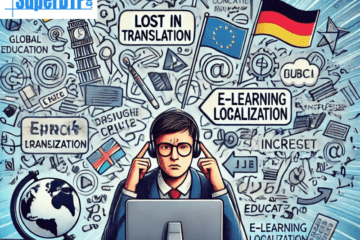The need for e-learning has increased as the globe gets more connected. Companies and educational institutions are reaching a wider audience thanks to the growth of online education platforms. E-learning localization, however, becomes essential for effectively engaging learners from many cultures and geographical areas. The significance of e-learning localization will be discussed in this article, along with the distinctions between globalisation and localization, the advantages of e-learning localization services, advice on picking the best e-learning localization service provider, a discussion of the difficulties involved in e-learning localization, and suggestions for overcoming them.
The Importance of E-Learning Localization
E-learning has developed into a potent instrument for education and training in today’s globalised environment. It enables students to access a wide variety of classes and resources from any location in the world. The efficiency of e-learning programmes might, however, be hampered by linguistic and cultural hurdles. E-learning localization is crucial in this situation. Localization makes ensuring that learners can completely understand and interact with the materials, resulting in improved learning results. This is done by customising e-learning content to the language, cultural quirks, and preferences of the target audience.
Understanding the Difference between Globalization and Localization
Understanding the distinction between localization and globalisation is crucial before delving further into e-learning localization. Although these words are frequently used interchangeably, they refer to different processes. Globalisation is the process through which e-learning materials are modified to be accessible to students from all over the world. Localization, on the other hand, focuses on adjusting the content to a particular place while taking language, cultural references, and regional preferences into account. Localization goes beyond translation in the context of e-learning; it also entails modifying images, examples, and evaluations to appeal to the target audience.
Benefits of E-Learning Localization Services
- Enhanced Learner Engagement: E-learning localization services foster learner engagement by delivering content in the learners’ native language. This creates a sense of familiarity and ensures that learners can fully comprehend the material, resulting in increased motivation and participation.
- Improved Learning Outcomes: When learners can understand and relate to the content on a deeper level, their learning outcomes improve significantly. E-learning localization services enable learners to grasp complex concepts, follow instructions accurately, and apply their knowledge effectively.
- Cultural Sensitivity: E-learning localization services take into account cultural sensitivities and adapt the content accordingly. This ensures that the learning experience is respectful and inclusive, avoiding any potential misunderstandings or offensive content.
- Expanded Market Reach: By localizing e-learning content, companies, and educational institutions can expand their market reach and tap into new regions. This allows them to cater to a broader audience, increase their brand visibility, and potentially boost revenue.
Choosing the Right E-Learning Localization Service Provider
When it comes to e-learning localization, selecting the right service provider is crucial to ensure the success of your program. Here are some factors to consider when choosing an e-learning localization service provider:
- Expertise and Experience: Look for a service provider with expertise in e-learning localization and a proven track record. Consider their experience in working with similar projects and their familiarity with different languages and cultures.
- Language Capabilities: Ensure that the service provider has a wide range of language capabilities to cater to the needs of your target audience. They should have a team of skilled translators and linguists who can accurately convey the message and tone of your e-learning content.
- Quality Assurance Processes: Quality is paramount in e-learning localization. The service provider should have robust quality assurance processes in place to ensure accurate translations, cultural adaptation, and adherence to industry standards.
- Technological Capabilities: In today’s digital age, technological capabilities are essential for efficient e-learning localization. Look for a service provider that utilizes advanced translation management systems, CAT tools, and multimedia localization tools to streamline the process and ensure consistency.
Challenges in E-Learning Localization and How to Overcome Them
While e-learning localization offers numerous benefits, it also presents certain challenges. Here are some common challenges in e-learning localization and strategies to overcome them:
- Cultural Adaptation: Adapting e-learning content to different cultures can be complex. To overcome this challenge, collaborate closely with your localization service provider and provide them with detailed information about your target audience’s cultural preferences and sensitivities.
- Maintaining Consistency: Ensuring consistency across multiple e-learning modules and courses can be challenging. To address this, establish style guides, glossaries, and translation memories that can be shared with the localization team. Regular communication and feedback loops are also essential for maintaining consistency.
- Time and Cost Constraints: E-learning localization projects often have tight timelines and budget constraints. To overcome this, plan ahead and allocate sufficient time and resources for the localization process. Collaborate with your service provider to optimize workflows and leverage technology to streamline the localization process.
Conclusion
E-learning localization is a potent tool to increase your audience and successfully engage students from various cultures and geographic locations. You may overcome the obstacles and realise the full potential of your e-learning program by comprehending the distinction between globalisation and localization, appreciating the advantages of e-learning localization services, and selecting the best service provider. To develop inclusive and powerful learning experiences that connect with your international audience, embrace e-learning localization.
CTA: Ready to take your e-learning program to new heights? Contact us to get in touch with our e-learning localization experts today to discuss your localization needs and unlock the power of global education.
www.superdtp.com


